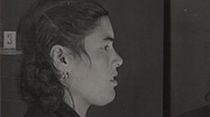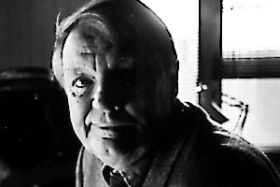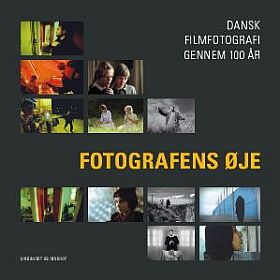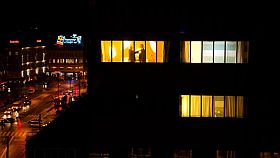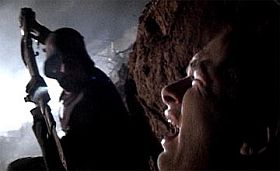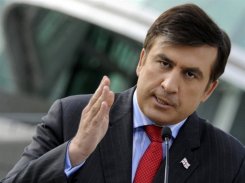Det tredje billede er fra Henrik Bohn Ipsens Drømme i København (Max Kestner 2010), som får premiere næste måned. Jeg kender ikke andre billeder end dette. Men det lover et eller andet, som er mere bestemt, end man skulle tro. Der er noget med dette indrammede liv inde i husene. For mig har det at gøre med Esbjergfilmen, som Bohn Ipsen også lavede sammen med Kestner. Jeg forsøger i min tekst til Fotografens øje at indkredse denne læsning af disse billeder sådan:
”… ’En rigtig historie’ er undertitlen på Max Kestners Nede på jorden (2004), som Henrik Bohn Ipsen har fotograferet som en ganske usædvanlig rigtig historie. Også i fotografisk stil er filmen et overraskende bud på en ny socialrealisme. Den har en indtrængende nænsomhed i personskildringen, som dejligt køligt kombineres med en omhyggeligt beregnet placering af det bevægelige kamera efter ganske få regler, som strikt overholdes, og som jeg vist lærer at kende. Herefter er der i den verden ingen pludselighed mere, kun tryghed.
Kameraet ser almindeligheden statuarisk, fotografiet skriver et monument over den kultur. Skildrer omhyggeligt de to i sofaen foran tv-apparatet. Skildrer dem i samtale, som jeg kender dem, som jeg holder af dem. På samme måde to andre et lige så nede-på-jorden sted, på indkøb i supermarkedet. At tænke sig supermarkedet som et fortrolighedens rum.
Det åbner med arbejdssituationen i denne forsigtige vandrette kamerabevægelse, som jeg altid vil huske filmen for. Kameraet er lyttende til samtalen, som det finder langt vigtigere, end for eksempel hvordan gummibådene laves. Sådan skildres også møderne i gruppen, frokosterne.
Hele tiden denne lyttende kamerakørsel og så en pludselig udpegning af en person, som jeg fæstner mig ved, lærer at kende. Hele tiden horisontale bevægelser. Jeg tror, der filmen igennem afstås fra vertikale kamerature. Nej, i Tivoli langt inde i filmen følger kameraet med ét blikket op mod lysene. Her kommer så også kysset.
Det er nok en reaktion mod det bårne kameras dominans gennem en årrække, men måden er ikke valgt derfor. Det skyldes valget af det statuariske, det er en beregnet kuldslået, men værdig skildring af disse mennesker, deres ting, deres rum og deres huse. Og oversat til alle andre greb i filmen dæmper dette statuariske princip komediestilen i de stiliserede vignetter i bilkørslernes klassiske filmbillede. De bliver monument over dette så almindelige, at køre på arbejde sammen.
Opdeling af billedfeltet i lodrette og vandrette linjer er markant scene for scene. Findes en bagvæg for scenen, bevæges kameraet naturligvis parallelt med den, findes en lodret linje i en port eller dør, oprettes der parallelitet med billedets lodrette kant. Det er en helt ny og overraskende poetisk realisme ude ved det danske Vesterhav med de store himmelbilleder, igen en Ipsensk specialitet af fotografisk lavmælthed. Sådan fotograferes en filmisk statue.”
Det var Esbjergbillederne. At de nye københavnerbilleder er af denne slægt, men også anderledes, yngre selvfølgelig, men bestemt i slægt, antyder Max Kestner i et interview med Kim Skotte:
”Vi var nødt til at tage en beslutning om, hvor fokus, hvor skarpheden skulle ligge henne… Vi valgte, at det ikke skulle ligge på menneskene, men på byen. Det vil sige, at menneskene kun kan komme ind i skarpheden, hvis de befinder sig langs en facade eller går rundt på en altan eller står helt henne ved vinduet. Bygningerne står altid skarpt…”
Nu ikke længere menneskene, men deres huse. Fokusskift i samme ramme. Vi får se… premiere 7. januar.
Litt.: Dirk Brüel, Andreas Fischer-Hansen og Jan Weincke, red.: Fotografens øje, Dansk filmfotografi gennem 100 år, 2009.




